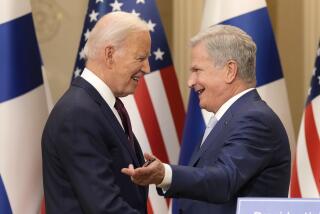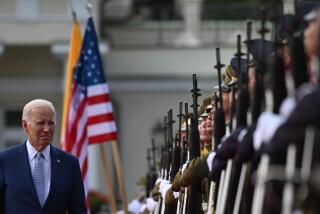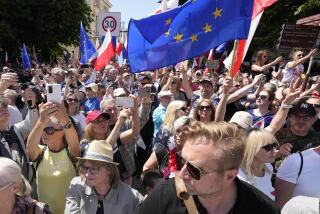Nationalists Rally in 3 Baltic States : Assail Stalin-Nazi Accord That Led to Soviet Incorporation
- Share via
MOSCOW — Nationalists from the Soviet Baltic republics of Estonia, Latvia and Lithuania, on the 49th anniversary of Moscow’s still-controversial pact with Nazi Germany, Tuesday fiercely debated the resulting incorporation of the three states into the Soviet Union.
The official Soviet news agency Tass reported that about 100,000 people took part in the largest rally, in the Lithuanian capital of Vilnius, followed by candlelight processions through the city. About 10,000 people participated in a similar rally in Kaunas, the republic’s second-largest city and a stronghold of Lithuanian nationalism.
For the record:
12:00 a.m. Aug. 25, 1988 For the Record
Los Angeles Times Thursday August 25, 1988 Home Edition Part 1 Page 2 Column 5 Foreign Desk 1 inches; 22 words Type of Material: Correction
An article in Wednesday’s editions of The Times incorrectly described the flag of Lithuania before World War II. The correct colors are yellow, green and red.
Several thousand also met in Riga, the capital of Latvia, and in Tallinn, the Estonian capital, according to official reports.
Dissident sources asserted, however, that more than 200,000 had attended the Vilnius rally and 50,000 the one in Kaunas. A crowd unofficially estimated at 30,000 to 40,000 took part in the Riga rally, and in Tallinn, about 10,000 participated.
All Officially Sanctioned
According to dissident sources, more than a third of a million people attended the various rallies--all officially sanctioned--in one of the largest displays of Baltic nationalism in years.
Lionginas Sepetis, secretary of the Lithuanian Communist Party, told the Vilnius rally that the political and economic reforms under way in the Soviet Union will turn the country into a genuine federal state in which the constituent republics will have far greater autonomy.
Sepetis and other speakers condemned the repression in Lithuania under dictator Josef Stalin, saying that it had severely set back the cause of socialism in the republic and had weakened defenses against the subsequent Nazi invasion.
But they argued the official Soviet line that Moscow had little choice but to sign the pact on Aug. 23, 1939, to buy time to build its defenses for the war with Nazi Germany that came in 1941.
The incorporation of Lithuania and the other Baltic republics into the Soviet Union similarly was described as a necessary move supported by “progressive forces” there in face of the Nazi threat because only the Soviet Union could protect them.
But speakers at other rallies, entering political territory that once was forbidden, disputed this official Soviet version of history--that the three states, independent between the two world wars, had willingly joined the Soviet Union in 1940. They implicitly accused the Soviet government of occupying their countries.
While history may be irreversible, they asserted, it should at least mean greater autonomy today for the three Baltic republics in recognition of their forced incorporation into the Soviet Union under a secret protocol to the Molotov-Ribbentrop pact, named for the Soviet and German foreign ministers at the time.
“The signing of the pact resulted in the occupation of Estonia,” Yuri F. Afanasyev, a leading Soviet historian, told the rally in Tallinn.
“We are speaking now of historical injustices, and we have no right to be silent about this. . . . In no other country has history been falsified to the extent that it has been in the Soviet Union.”
Ardent nationalists in Estonia as well as in Latvia and Lithuania called, as they have before on the anniversary of the pact, for the Baltic states’ independence.
“It is not enough to recognize the Soviet occupation of 1940,” Lagle Parek, an Estonian activist, told the Tallinn rally. “We have to restore our independence.”
Afanasyev, a prominent liberal in Soviet politics, told the rally he supported proposals for Estonian economic independence, as urged by the republic’s new political organization, the Popular Front, which supports the reforms of Soviet leader Mikhail S. Gorbachev but now rivals Estonia’s Communist Party in size and influence.
But Afanasyev warned against calls for Estonian secession from the Soviet Union, saying they could “bring about a great tragedy which we cannot even imagine.”
Never have Estonian authorities allowed such open discussion of the Molotov-Ribbentrop pact or such a huge display of criticism of its official Soviet interpretation, and the rallies reflected the new openness in Estonian politics.
Less than two weeks ago, two Estonian newspapers became the first here to publish parts of the secret Molotov-Ribbentrop agreement, although it is still not officially acknowledged by Moscow as authentic.
Created a Sensation
The publication was a sensation among all Baltic nationalists, and some radicals predict now that the three states could pull themselves away from the Soviet Union in several years.
Historian Afanasyev said the Soviet contention that the Baltic countries joined the Soviet Union voluntarily was “not serious” and said the protocols should have been published long ago. They were published in the West in 1948, he added, and “every schoolchild in the West knows about them. But we continued to deny their existence.”
In Moscow, Foreign Ministry spokesman Gennady I. Gerasimov repeated that the Soviet archives have no copies of the secret protocols. He said the originals did not exist and that the only copies of the documents are in the West.
The Vilnius rally was organized by the Movement for Perestroika, the Lithuanian counterpart of the Popular Front in Estonia. It drew dozens of leading writers, artists, scientists, educators and other members of the intelligentsia who have often been at odds with the Communist Party there.
The red, gold and yellow flag of independent Lithuania was widely displayed at the rally and then carried through the city’s streets--actions that would have meant immediate arrest and probable imprisonment only two months ago, when display of the flag was still prohibited.
Last year, on the 48th anniversary of the signing of the nonaggression pact, rallies in three Baltic capitals drew about 7,500 people.
More to Read
Sign up for Essential California
The most important California stories and recommendations in your inbox every morning.
You may occasionally receive promotional content from the Los Angeles Times.













